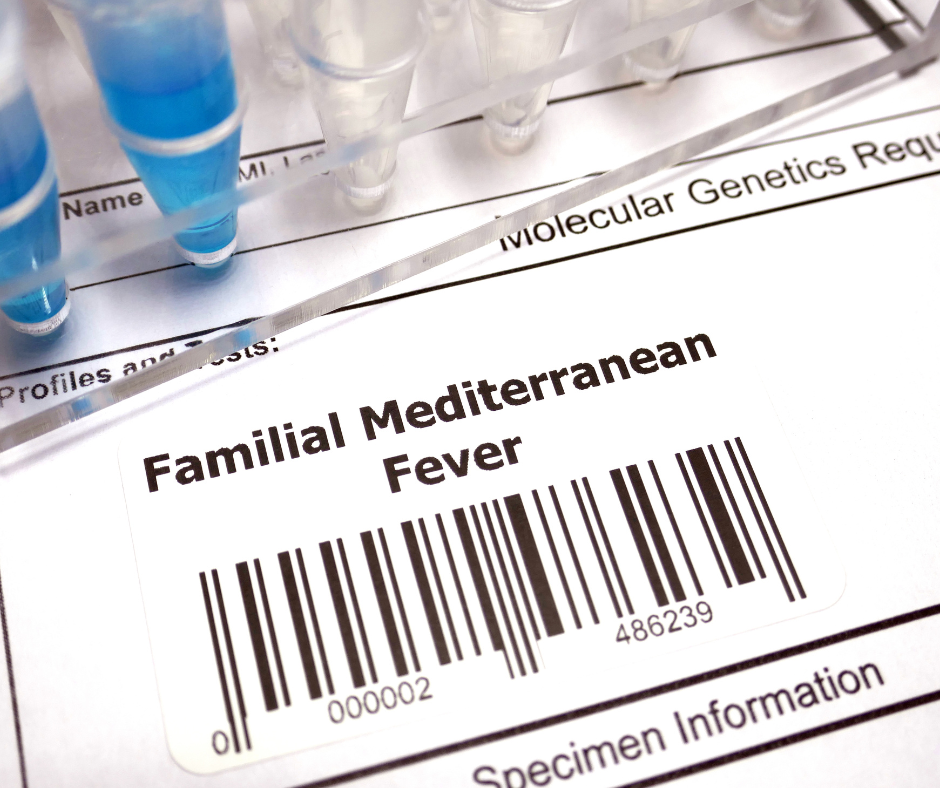Familial Mediterranean Fever (FMF) is a hereditary autoinflammatory disorder that primarily affects people of Mediterranean and Middle Eastern descent, including those of Jewish, Arab, Armenian, Turkish, North African, Greek, and Italian ancestry. This condition is characterized by recurrent episodes of fever and inflammation in the abdomen, chest, and joints.
Familial Mediterranean Fever (FMF): A Comprehensive Overview

Familial Mediterranean Fever (FMF) is a hereditary autoinflammatory disorder that primarily affects people of Mediterranean and Middle Eastern descent, including those of Jewish, Arab, Armenian, Turkish, North African, Greek, and Italian ancestry. This condition is characterized by recurrent episodes of fever and inflammation in the abdomen, chest, and joints.
How Common is Familial Mediterranean Fever (FMF)?
Familial Mediterranean Fever (FMF) is most prevalent among individuals of Turkish, Armenian, Middle Eastern, North African Jewish, and Arab descent. Here are some key points about its prevalence:
- Turkey: FMF is highly prevalent, with estimates ranging from 1 in 150 to 1 in 10,000 people, depending on the region.
- Armenia: The prevalence is about 1 in 500 people, with a carrier rate of 1 in 7.
- Israel: Among non-Ashkenazi Jews, the prevalence ranges from 1 in 500 to 1 in 1,000, while among Ashkenazi Jews, it is much lower at 1 in 73,000.
- Other Regions: FMF has also been reported in Greece, Italy, Japan, and China, but at lower prevalence rates.
- The carrier rates for MEFV gene mutations vary among different ethnic groups, with 1 in 5 among Iraqi Jews, 1 in 3.5 among Moroccan Jews, and 1 in 4.3 among Muslim Arabs
Causes and Genetic Basis of Familial Mediterranean Fever
FMF is caused by mutations in the MEFV gene, which encodes a protein called pyrin. Pyrin plays a crucial role in regulating inflammation in the body. When mutations occur in the MEFV gene, it disrupts the function of pyrin, leading to uncontrolled inflammation. The disorder follows an autosomal recessive inheritance pattern, meaning that an individual must inherit two copies of the mutated gene (one from each parent) to develop FMF.
Symptoms and Attacks of Familial Mediterranean Fever (FMF)
Symptoms of FMF typically begin during childhood and manifest as sudden episodes or "attacks" that last from 1 to 3 days. These attacks can vary in intensity and frequency. Common symptoms include:
Fever: High fever is a hallmark of FMF attacks.
Abdominal Pain: Severe abdominal pain resembling peritonitis (inflammation of the abdominal lining).
Chest Pain: Pain in the chest, often due to inflammation of the pleura (pleuritis) or pericardium (pericarditis).
Joint Pain: Painful, swollen joints, usually in the knees, ankles, and hips.
Rash: A red rash on the legs, particularly below the knees.
Muscle Aches: Generalized muscle aches.
Scrotal Pain: In males, inflammation of the tunica vaginalis can cause a swollen, tender scrotum.
Familial Mediterranean Fever (FMF) can significantly impact the quality of life (QoL) of affected individuals.
Here are some key ways it affects daily life:
- Physical Impact: Recurrent fever episodes and chronic pain can lead to physical limitations, affecting mobility and the ability to perform daily activities. This can result in missed work or school days and reduced overall physical functioning.
- Psychological Impact: The unpredictability of FMF attacks can cause anxiety and stress. Chronic pain and frequent hospital visits can also lead to depression and emotional distress.
- Social and Recreational Impact: FMF can interfere with social interactions and recreational activities. The need for frequent medical care and the fear of sudden attacks can make it difficult for individuals to participate in social events and maintain relationships.
- Sleep Disturbances: Pain and discomfort during attacks can disrupt sleep patterns, leading to fatigue and decreased energy levels. Poor sleep quality can further exacerbate the physical and psychological burden of the disease.
- Impact on Work and Education: The physical and emotional toll of FMF can affect performance at work or school. Frequent absences and reduced productivity can hinder career advancement and educational progress.
- Healthcare Burden: Managing FMF requires regular medical appointments, medication, and sometimes hospitalizations, which can be financially and logistically challenging.
Despite these challenges, effective management and treatment can help improve the quality of life for individuals with FMF. Regular follow-up with healthcare providers, adherence to treatment plans, and psychological support are crucial in mitigating the impact of the disease.
Diagnosing Familial Mediterranean Fever
Diagnosing FMF involves a combination of clinical evaluation, family history, and laboratory tests. Genetic testing can confirm the presence of mutations in the MEFV gene, although it may not detect all possible mutations. The Tel-Hashomer clinical criteria are widely used to diagnose FMF, requiring recurrent febrile episodes with painful inflammation lasting 12 to 72 hours.
Treatment and Management of Familial Mediterranean Fever
While there is no cure for FMF, treatment focuses on managing symptoms and preventing complications. The primary medication used is colchicine, which helps reduce inflammation and prevent attacks. For those who do not respond to colchicine, other medications that block interleukin-1, such as canakinumab, rilonacept, and anakinra, may be prescribed. Regular monitoring and follow-up with a healthcare provider are essential to manage the condition effectively.
Complications of Familial Mediterranean Fever
One of the most serious complications of FMF is amyloidosis, a condition where abnormal proteins (amyloid) accumulate in organs, particularly the kidneys, leading to organ dysfunction. Early diagnosis and treatment are crucial to prevent this complication.
Familial Mediterranean Fever is a complex genetic disorder that requires careful management and treatment to prevent recurrent attacks and complications. Understanding the genetic basis, recognizing the symptoms, and adhering to a treatment plan can significantly improve the quality of life for individuals with FMF.
Sign up for our newsletters
International Foundation for AiArthritis
6605 Nottingham Ave.
St. Louis, MO 63109-2661
Tax ID: 27-1214308
Toll Free: 1-877-609-4226
Email: info@AiArthritis.org
Copyright 2024. All rights reserved. Information on this site is intended for informational purposes only Our foundation does not engage in the practice of medicine. Please consult a physician to obtain personal healthcare and treatment options. 501(c) 3 Nonprofit Tax ID: 27-1214308.






